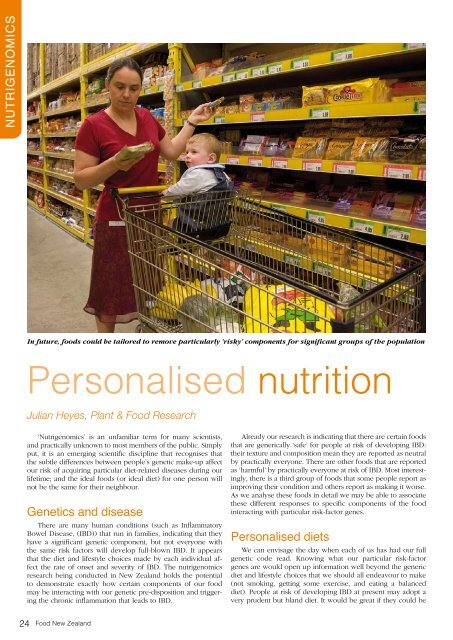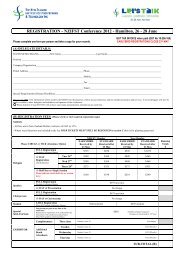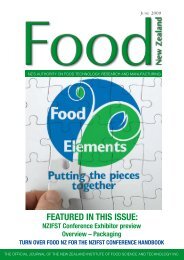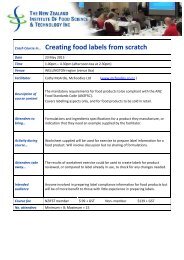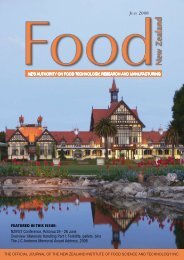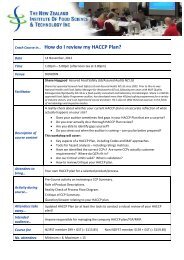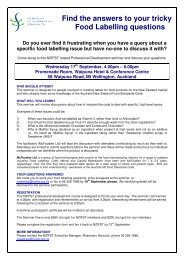featured in this issue - NZIFST - The New Zealand Institute of Food ...
featured in this issue - NZIFST - The New Zealand Institute of Food ...
featured in this issue - NZIFST - The New Zealand Institute of Food ...
You also want an ePaper? Increase the reach of your titles
YUMPU automatically turns print PDFs into web optimized ePapers that Google loves.
NUTRIGENOMICS<br />
In future, foods could be tailored to remove particularly ‘risky’ components for significant groups <strong>of</strong> the population<br />
Personalised nutrition<br />
Julian Heyes, Plant & <strong>Food</strong> Research<br />
‘Nutrigenomics’ is an unfamiliar term for many scientists,<br />
and practically unknown to most members <strong>of</strong> the public. Simply<br />
put, it is an emerg<strong>in</strong>g scientific discipl<strong>in</strong>e that recognises that<br />
the subtle differences between people’s genetic make-up affect<br />
our risk <strong>of</strong> acquir<strong>in</strong>g particular diet-related diseases dur<strong>in</strong>g our<br />
lifetime; and the ideal foods (or ideal diet) for one person will<br />
not be the same for their neighbour.<br />
Genetics and disease<br />
<strong>The</strong>re are many human conditions (such as Inflammatory<br />
Bowel Disease, (IBD)) that run <strong>in</strong> families, <strong>in</strong>dicat<strong>in</strong>g that they<br />
have a significant genetic component, but not everyone with<br />
the same risk factors will develop full-blown IBD. It appears<br />
that the diet and lifestyle choices made by each <strong>in</strong>dividual affect<br />
the rate <strong>of</strong> onset and severity <strong>of</strong> IBD. <strong>The</strong> nutrigenomics<br />
research be<strong>in</strong>g conducted <strong>in</strong> <strong>New</strong> <strong>Zealand</strong> holds the potential<br />
to demonstrate exactly how certa<strong>in</strong> components <strong>of</strong> our food<br />
may be <strong>in</strong>teract<strong>in</strong>g with our genetic pre-disposition and trigger<strong>in</strong>g<br />
the chronic <strong>in</strong>flammation that leads to IBD.<br />
Already our research is <strong>in</strong>dicat<strong>in</strong>g that there are certa<strong>in</strong> foods<br />
that are generically ‘safe’ for people at risk <strong>of</strong> develop<strong>in</strong>g IBD:<br />
their texture and composition mean they are reported as neutral<br />
by practically everyone. <strong>The</strong>re are other foods that are reported<br />
as ‘harmful’ by practically everyone at risk <strong>of</strong> IBD. Most <strong>in</strong>terest<strong>in</strong>gly,<br />
there is a third group <strong>of</strong> foods that some people report as<br />
improv<strong>in</strong>g their condition and others report as mak<strong>in</strong>g it worse.<br />
As we analyse these foods <strong>in</strong> detail we may be able to associate<br />
these different responses to specific components <strong>of</strong> the food<br />
<strong>in</strong>teract<strong>in</strong>g with particular risk-factor genes.<br />
Personalised diets<br />
We can envisage the day when each <strong>of</strong> us has had our full<br />
genetic code read. Know<strong>in</strong>g what our particular risk-factor<br />
genes are would open up <strong>in</strong>formation well beyond the generic<br />
diet and lifestyle choices that we should all endeavour to make<br />
(not smok<strong>in</strong>g, gett<strong>in</strong>g some exercise, and eat<strong>in</strong>g a balanced<br />
diet). People at risk <strong>of</strong> develop<strong>in</strong>g IBD at present may adopt a<br />
very prudent but bland diet. It would be great if they could be<br />
24<br />
<strong>Food</strong> <strong>New</strong> <strong>Zealand</strong>


